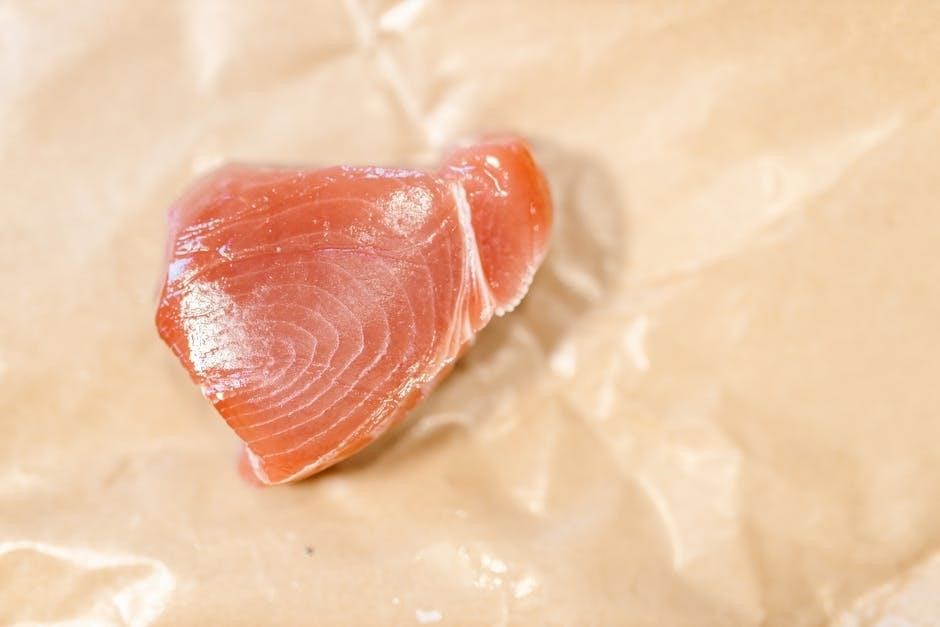
kosher fish list pdf
Kosher fish are species that meet specific Jewish dietary laws, primarily having fins and scales. They are widely consumed in Jewish communities, with detailed lists available in Kosher fish list PDF guides for easy reference.

Definition of Kosher Fish
A kosher fish is defined by Jewish dietary laws as a species with both fins and scales, which can be easily removed by hand or with a knife. These characteristics distinguish kosher fish from non-kosher seafood. Common examples include salmon, cod, and tilapia. The scales must not damage the skin when detached, aligning with rulings by scholars like Nachmanides. Fresh and frozen kosher fish, whole or filleted, are permitted if they retain skin with scales. However, minced fish and processed products require rabbinical supervision to ensure compliance. This definition ensures adherence to traditional kosher standards, providing clear guidelines for consumers seeking to identify permissible fish species.

Criteria for Kosher Fish
Kosher fish must have fins and scales that can be easily removed by hand or knife without damaging the skin, following traditional Jewish dietary laws.
Fins and Scales Requirement
The fundamental criterion for a fish to be kosher is the presence of both fins and scales. According to Jewish dietary laws, scales must be easily removable by hand or knife without damaging the skin, as emphasized by Nachmanides. This requirement ensures the fish’s identity and adherence to kosher standards. Fins must be visible and attached, while scales should not be embedded or difficult to detach. This rule applies universally, making it a cornerstone of kosher certification; Practical guides, such as Kosher fish list PDF documents, often detail species that meet these criteria, aiding consumers in making informed choices. Proper verification of these features is essential to ensure compliance with traditional Jewish dietary practices.
Common Kosher Fish Species
Popular kosher fish include Salmon, Cod, Herring, and Flounder. These species are widely recognized and consumed, adhering to kosher standards as outlined in Kosher fish list PDF guides.
Examples of Kosher Fish
Some commonly consumed kosher fish include Salmon, Cod, Herring, Flounder, and Carp. These species are widely recognized as kosher due to their fins and scales. Additionally, fish like Pike, Mackerel, and Halibut are also considered kosher. These examples are frequently listed in Kosher fish list PDF guides, which provide detailed information on acceptable species. Verification from reliable kosher certification agencies ensures adherence to dietary standards. Always consult trusted sources for accurate identification and consumption guidance.

Kosher Fish Certification
Kosher fish certification ensures species meet Jewish dietary laws, verified by agencies like Scroll K and Star-K. This process guarantees fins and scales are present, upholding tradition.
Process and Importance of Certification
The process involves verifying fish species have fins and scales, with agencies like Scroll K and Star-K ensuring compliance. Certification ensures adherence to Jewish law, providing trusted verification for consumers.
Digital Resources for Kosher Fish Lists
Reputable websites like Chabad.org and Kashrut.com offer downloadable Kosher fish list PDF guides, ensuring easy access to updated information on kosher species for consumers and cooks.
PDF Guides and Online Directories
PDF guides and online directories provide comprehensive lists of kosher fish, ensuring easy access to verified species. Websites like Chabad.org and Kashrut.com offer downloadable Kosher fish list PDF files, detailing fish names, scientific classifications, and kosher status. These resources are updated regularly to reflect current Jewish dietary laws. Online directories often include search features, allowing users to quickly identify kosher fish by common or scientific names. Many guides also provide images and descriptions to aid recognition. Additionally, organizations like the JSOR (Jewish Society for Orthodox Rabbis) publish detailed PDF lists, ensuring accuracy and adherence to tradition. These resources are invaluable for consumers, chefs, and Jewish communities worldwide, offering reliable information to maintain kosher standards.

Health Considerations for Kosher Fish Consumption
Kosher fish may contain PCBs, posing health risks. Vulnerable groups should limit consumption of high-PCB species. Always check kosher fish list PDF for safer choices.
PCB Levels and Safety Recommendations
PCB levels in kosher fish vary, with higher concentrations in larger, fatty species like mackerel and salmon. These pollutants pose health risks, especially for vulnerable groups.
To minimize exposure, consume smaller fish and vary species. Pregnant women and children should limit intake of high-PCB fish.
Consult kosher fish list PDF guides for species-specific advice. Health authorities recommend checking PCB levels and adhering to portion guidelines for safer consumption.

Kosher fish, defined by their fins and scales, offer a variety of healthy and delicious options. Always refer to a kosher fish list PDF for accurate guidance. These resources detail permissible species, ensuring adherence to Jewish dietary laws. Health considerations, such as PCB levels, are crucial for safe consumption. Popular choices like salmon and mackerel are highlighted, while others may pose risks. By consulting trusted certification agencies and guides, consumers can make informed decisions. Emphasizing reliable sources ensures a balance between tradition and health. This approach fosters confidence in maintaining kosher standards while enjoying seafood responsibly. Always prioritize verified lists and expert recommendations for the best outcomes.
Related posts:
Archives
- January 2026
- December 2025
- November 2025
- October 2025
- September 2025
- August 2025
- July 2025
- June 2025
- May 2025
- April 2025
- March 2025
- February 2025
- January 2025
- December 2024
- November 2024
- October 2024
- September 2024
- August 2024
- July 2024
- June 2024
- May 2024
- April 2024
- March 2024
- February 2024
- January 2024
- December 2023
- November 2023
- October 2023
- September 2023
- August 2023
- July 2023
- June 2023
- May 2023
Calendar
| M | T | W | T | F | S | S |
|---|---|---|---|---|---|---|
| 1 | 2 | 3 | 4 | |||
| 5 | 6 | 7 | 8 | 9 | 10 | 11 |
| 12 | 13 | 14 | 15 | 16 | 17 | 18 |
| 19 | 20 | 21 | 22 | 23 | 24 | 25 |
| 26 | 27 | 28 | 29 | 30 | 31 | |
Leave a Reply
You must be logged in to post a comment.